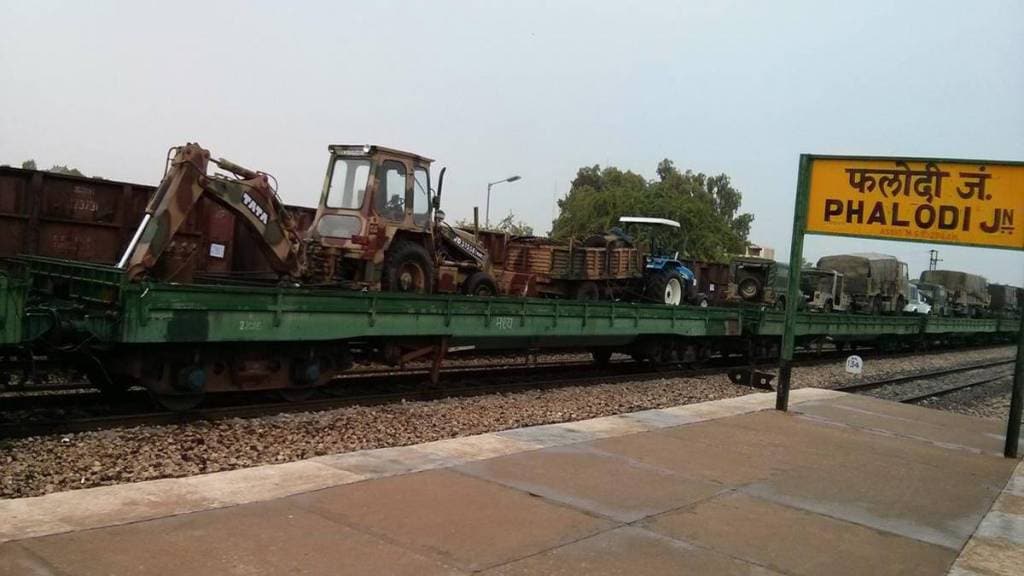When Congress leader Rahul Gandhi began his campaign leg in Rajasthan for the coming Lok Sabha elections, Phalodi was on Day 1 of his itinerary. Phalodi, an otherwise sleepy town known for the large number of industries involved in the production of salt and plaster of Paris, is infamous for good reason.
Located in the buffer zone of the Thar desert 142 km from Jodhpur, Phalodi is known in India and abroad as the nerve centre of election-related betting in Rajasthan. What makes the Phalodi Satta Bazar so famous? It is for its bookies that rarely get a poll prediction wrong. “The Phalodi market is known for its accuracy, and therefore, we continue to be in demand,” Times Of India quoted a bookie as saying in 2019.
This claim, nevertheless, is no exaggeration. In the Assembly elections held in November-December 2023, the BJP bagged the heartland states of Rajasthan, Madhya Pradesh, and Chhattisgarh while the Congress won Telangana. Punters at the Phalodi betting market had predicted 110-112 seats for the BJP and saw the party forming government in Rajasthan.
Similarly, the Satta Bazar here predicted an outcome contrary to what most exit polls had predicted for the Chhattisgarh election results. The Phalodi satta Bazar projected 50-52 seats for the BJP and 37-39 seats for the Congress. The BJP eventually went on to form the government in the state.
The betting market also got predictions right for the Gujarat and Himachal Pradesh elections held a year ago in 2022. The bookies here had given a clear mandate to the BJP in Gujarat while predicting a tough contest in Himachal Pradesh with a slight edge for the Congress.
The market predicted a minimum of 136-138 seats for the BJP in the state, 30-31 for the Congress and 8-9 seats for the Aam Aadmi Party. The BJP eventually claimed victory on 156 seats in the 182-member Assembly, its highest-ever tally in Gujarat. The Congress, on the other hand, emerged victorious in Himachal Pradesh, winning 40 seats in the state against the BJP’s tally of 25.
How does the Phalodi Satta Bazar work?
Counted among the biggest betting centres in India, the Phalodi Satta Bazar deals in different kinds of betting. While elections are its mainstay, drawing bets worth several hundreds of crores, it also draws significant traction for placing bets on rains and cricket.
The market opens at around 11 AM every day with the rates decided one hour prior on a daily basis. The market remains operational till around 5 PM and people place bets either through the phone or physically. The winners receive their bounty through some phone wallets, TOI reported.Betting activities prominently began here after India achieved Independence – the market earlier bet on the cotton rates going up or down. Punters or bookies, people placing the bets and two-dozen-odd people who work here form the crucial links that bind the whole operation together in a market where all bets are placed verbally.
Besides bookies, this bazaar also has its own sources of political information with people placed across major political centres. The bazaar decides rates based on the inputs it receives. From caste calculations to winnability, these sources have their ear to the ground and pass on information to the organisers.
Phalodi Satta Bazar prediction for Lok Sabha elections 2024
As per the latest projections of the betting market, the BJP is expected to win at least 330-333 seats in the LOk Sabha elections while the Congress is predicted to win 41-43 seats. The rates at the Phalodi Satta Bazar at even for the BJP winning 330-335 seats, Rs 3 for 350 seats (a return of Rs 3 for every rupee invested), and Rs 12-Rs 15 for the BJP winning 400 seats.
A tally of 400 for the NDA will fetch Rs 4-5 for every rupee bet, implying that the punters here believe that the BJP is unlikely to win 400 seats on its own. A tally of 350 for the BJP on its own looks likely with the odds stacked evenly.
What are the laws regarding betting in India?
There is no nationwide law regarding gambling in India and it has been left to the discretion of the state governments. Making laws against it falls within the jurisdiction of state governments. For example, in many states of the country, gambling is completely banned, including Madhya Pradesh, Rajasthan, and Chhattisgarh. However, in some states, gambling is legally recognised, such as Goa, Sikkim, and some northeastern states.
In Rajasthan, more than 50,000 cases are registered under the Public Gambling (Prevention) Act. Earlier, action was taken under the Rajasthan Public Gambling Ordinance of 1949. Now, under the new law, provisions have been made for fines and imprisonment for those running gambling establishments.
(DISCLAIMER: Gambling is illegal unless permitted by state-specific laws. Readers are advised to stay away from it. The purpose of this news item is only to present the prevailing trends in the betting market.)


